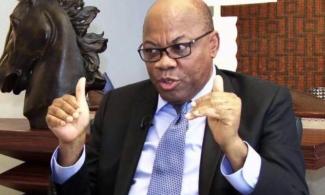
He noted that the powers under which EFCC was established go beyond the powers of the National Assembly, adding that many states have finally taken it upon themselves to challenge the constitutionality of the EFCC.
Mr Olisa Agbakoba, SAN, a former President of the Nigerian Bar Association (NBA), has stated that the Economic and Financial Crimes Commission (EFCC) was “unconstitutionally established.”
Agbakoba stated this in a letter dated October 14, 2024, addressed to Mr Benjamin Kalu, Deputy Speaker of the House of Representatives, who is also the Chairman of the House Committee on Constitution Review.
The Senior Advocate of Nigeria drew the attention of the National Assembly to constitutional issues relating to law enforcement agencies in the country and factors inhibiting the government’s objective of abolishing corruption as stated in Section 13 of the 1999 Constitution.
He noted that the powers under which EFCC was established go beyond the powers of the National Assembly, adding that many states have finally taken it upon themselves to challenge the constitutionality of the EFCC.
The letter reads in part, "I write to draw attention to certain constitutional issues related to law enforcement agencies. As you are aware, the fundamental objective of the government is to abolish corruption.
"However, from my observation, there is no harmony amongst law enforcement agencies regarding corruption. They all appear to be working at cross purposes. This has been confirmed by the Supreme Court in so many cases. The Supreme Court has consistently sanctioned the EFCC for its conduct and questioned if the EFCC can validly do what it does.
"I will go further to say that I very strongly believe the EFCC is unconstitutionally established. The powers under which it was established go beyond the powers of the National Assembly. The EFCC is an unlawful organization.
"I am very delighted to note that many states have finally taken it upon themselves to challenge the constitutionality of the EFCC. This will put to rest the question relating to the validity of the EFCC.
"Whilst we await the decision of the Supreme Court as the final court on the matter, I respectfully request that the House of Representatives convene a public hearing to consider these constitutional issues.
"Such a hearing would provide an invaluable platform for stakeholders to discuss the reforms needed to strengthen Nigeria's legal and institutional frameworks for law enforcement and anti-corruption which will meet the stated and laudable objective of the government to abolish corruption as stated in Section 13 of the Constitution.”
"I trust that, under your capable leadership, the House of Representatives Constitution Review Committee will give these matters urgent attention in the interest of our nation's development,” he added.